Hollywood Stars Call On Iran To Stop Execution Of Protesters
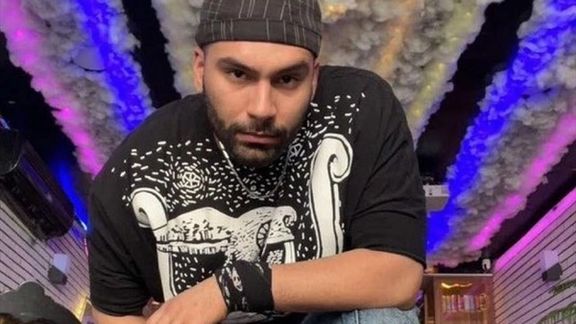
Dozens of Hollywood stars including Cate Blanchett, Jason Momoa, and Samuel L. Jackson, have called on Iran to stop executions of imprisoned protesters.

Dozens of Hollywood stars including Cate Blanchett, Jason Momoa, and Samuel L. Jackson, have called on Iran to stop executions of imprisoned protesters.
In this video, which was released on Friday, they said "We stand with the people of Iran in their fight for freedom. Thousands of protesters have been arrested. Some have already been executed. Many more are in danger, but the world is watching."
Just one day after the message by Hollywood stars, the clerical regime executed two more protesters Saturday morning, bringing the total to four in one month. Mohammad Mehdi Karami and Mohammad Hosseini were hanged amid international outcry against regime’s brutality. Mohsen Shekari and Majidreza Rahnavard had been hanged earlier.
This video messagewas produced in collaboration with Iranian-American screenwriter Nicole Najafi.
Najafi wrote on her Instagram that execution of protesters is the regime’s “last ditch effort to save themselves and terrorize their own people into submission. But Iranians will not back down.”
The Oslo-based Iran Human Rights Organization says at least 100 of the arrested protesters are at risk of receiving death penalty or being executed.
Since September 16 and following the death of Mahsa Amini in the custody of Tehran's morality police, Iran has been the scene of widespread protests, which have been met with violent repression by the Islamic Republic's security forces.
The execution of four Iranian protesters took place following hasty trials and without observing due process, which has provoked public anger in Iran and has been condemned by many around the world.
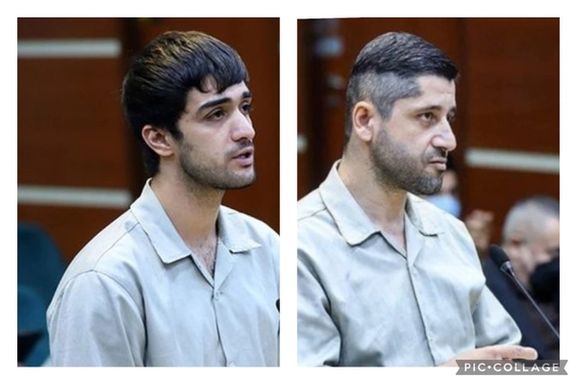
The clerical regime in Iran hanged two men on Saturday for allegedly killing a Basij agent during antigovernment protests near the capital Tehran in October.
"Mohammad Mehdi Karami and Seyyed Mohammad Hosseini, main perpetrators of the crime that led to the unjust martyrdom of Ruhollah Ajamian were hanged this morning," the judiciary said in a statement carried by the official IRNA news agency.
Karami was 22 years old, and Hosseini 39 were tried without having access to attorneys of their choosing, as almost all other dissidents and protesters arrested during the demonstrations. The circumstances related to the killing of Ajamian are not clear, as often the Basij paramilitary forces take the lead to attack protesters and use deadly force.
The convictions were not based on a criminal charge related to the murder per se, but they were charged with ‘moharebeh’, meaning “war against God”, a vague religious concept. The Islamic Republic applies the charge to people who might get into a confrontation with security forces during protests.
“I met with Seyed-Mohammad Hosseini at Karaj Prison. He cried through his account of tortures, being beaten with tied hands and legs and blindfolded, to being kicked in the head and losing consciousness, the soles of his feet being beaten with an iron rod to being tased in different parts of the body,” Ali Sharifzadeh Ardakani who says he has just recently been allowed to represent Hosseini tweeted on December 18.
Despite widespread international attempts to stop the executions, the regime decided to implement the verdict reached in November. Officials say death sentences for three others in the same case have been canceled.
So far, the government has executed four protesters and eleven others have received the death penalty, some for much less charges than murder, while at least 100 protesters face charges that could end in death sentences for them, an Iranian human rights group based in Oslo has reported.
The first two hangings triggered strong international condemnations and hundreds of lawmakers in Europe and Australia began sponsoring Iranian detainees in danger of execution to generate publicity and impact their fate.
French lawmaker Aude Luquet had taken on Hosseini’s political sponsorship and called for an immediate halt to all executions in Iran. Hosseini is also sponsored by Austrian parliamentarian Harold Truch.
Mohammad-Mehdi Karami was sponsored by Helge Limburg, member of the German parliament. “The regime in Iran assumes that he was involved in a killing. In truth he should die because he stands up for democracy and human rights. His execution would be a judicial killing,” Limburg tweeted December 12.
Activists had earlier called for protests in Iran and abroad on Sunday, January 8, the third anniversary of the downing of a Ukrainian airliner over Tehran by the Revolutionary Guard that killed all 176 people onboard. The executions on Saturday will add fuel to people's anger and big protests can take place as early as today.
Dozens of prisoners are either on hunger strike or suffer from life-threatening illnesses that are not treated by prison authorities and some are deprived of life-saving medications.
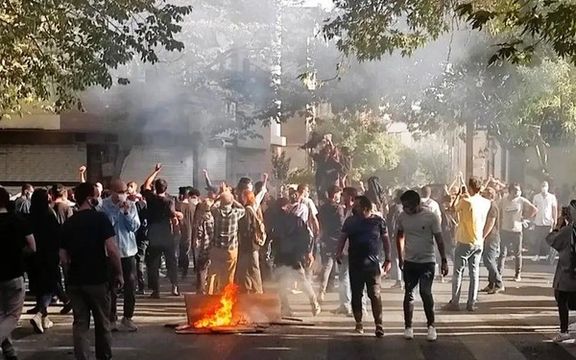
An audio file shared on social media has revealed that the regime threatens Iranians abroad for taking part in anti-government protests and expressing opposition.
In the audio file published by the VOA Farsi service on Thursday, a security agent of the Islamic Republic, who introduces himself as an agent of the intelligence ministry, threatens "Massi Kamri", an Iranian activist living in France, saying if she does not stop acting against the regime, they will imprison her parents and family members in Iran.
Apparently, she participated in rallies against the Islamic Republic’s bloody crackdown on antigovernment protests that have engulfed Iran following the death in custody of 22-year-old Mahsa Amini.
Using an insulting tone, the agent tells Kamri if she cares about her family and does not want them to be taken to the notorious Evin prison in Tehran she should not engage in anti-Islamic Republic activities.
The agent also says she must stop sharing Instagram stories and posts that encourage people in Iran to chant slogans and hold protests.
In another part of the recording, Kamri says her Instagram page is private and no one except her followers could see her posts, but the person from the intelligence ministry claims he has access to her page, saying “it’s right now open in front of me!”
Kamri insists that she has not done anything wrong according to the laws of France, where she is a permanent resident, but the agent says what she is doing is against the Islamic Republic. She told the regime’s agent that nowhere in the world do authorities hold accountable the family members of someone who commits a crime, but the agent replied this is Iran and they can do whatever they like.
This is not the first time Iranian agents threaten people living abroad for expressing their opinions. The Daily Telegraph recently reported that the Islamic Republic uses mosques and political institutions in the United Kingdom as part of its “spying system” to target dissidents.
Canada's spy agency also launched an investigation into what it calls multiple "credible" death threats from Iran aimed at individuals in Canada.
In November, Israel’s Mossad informed Britain’s spy agency about an impending Iranian plot to carry out terrorist attacks against Iran International’s journalists based in London.
According to information obtained by Iran International, threats against its journalists came from the same team that sought to target Israel’s former consul general in Istanbul, Yosef Levi Sfari, who was rescued by authorities and sent back to Israel.
Faced with nationwide antigovernment protests since mid-September, the Islamic Republic has blamed foreign-based Persian broadcasters such as BBC Persian and Iran International of “fomenting unrest”, while all media in the country are under tight government control and present protesters as “rioters” and “terrorists”. The Islamic Republic is notorious for tormenting the families of dissidents in every way it can think of, from abducting the bodies of the dead ones and burying them in undisclosed locations -- such as the case of late journalist Reza Haqiqatnejad -- to detaining and calling in family members for interrogations to warn them of talking to media about their loved ones.
Iran’s Intelligence Minister Esmail Khatib on November 9 said the Islamic Republic regards Iran International as “a terrorist organization,” adding that its workers and anyone affiliated with the channel will be pursued by the Ministry of Intelligence.
Iran has a long record of targeting dissidents and independent journalists who found refuge in other countries. In the latest example of terror operations abroad, Iranian intelligence abducted dissident journalist Ruhollah Zam who was visiting Iraq in 2019 and took him back to Iran where he was executed in 2020.
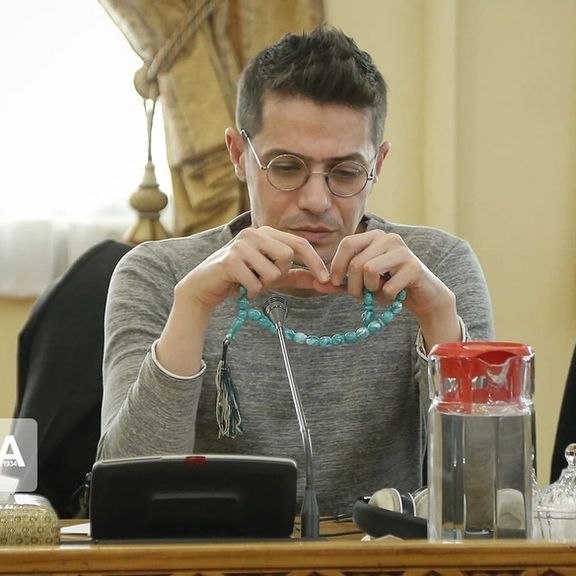
The Islamic Republic has arrested another journalist, bringing the number of detained reporters and photographers over the ongoing protests to well over 70.
Mehdi Beyk, the political editor of reformist Etemad newspaper, was arrested on Thursday.
Earlier in the week, the regime’s security forces arrested two other journalists -- Mehdi Ghadimi and Milad Alavi, both working for reformist media outlets.
On Sunday, regime’s agents raided the house of Mehdi Ghadimi’s father in Karaj, west of Tehran, and arrested the journalist who used to work for several dailies in Iran including Etemad and Shargh, both ‘reformist’ publications.
Tehran Journalists Association says at least 73 journalists and photographers have been arrested in the past four months, around the time when 22-year-old Mahsa Zhina Amini was killed in police custody triggering the current wave of antigovernment protests.
Niloufar Hamedi, Elaheh Mohammadi, Nazila Maroufian, the three journalists who broke the news of her death, covered her funeral and interviewed her father were also arrested.
The Brussels-based International Federation of Journalists said in mid-December that at least 57 journalists had been arrested in Iran since September. The international NGO also noted that only 30 of the 57 detained journalists have been reportedly released so far.
There are no exact figures on the number of people arrested during the protests, but some sources say nearly 20,000 people have been detained, more than 500 killed by security forces and many received serious injuries, such as losing their eyes when they were targeted by shotguns.

Sunni worshippers took to the streets for the 14th week in Zahedan after Friday prayers during which the popular cleric Abdolhamid delivered another fiery sermon.
“Whether facing gallows or prison, we will stand firm until the end!” a video posted on twitter shows protesters in Zahedan, capital of the southwestern province of Sistan-Baluchestan, chanting. In another video they are seen chanting “Down with the executioner Republic!”
Two young Baluch protesters, Mansour Dehmardeh and Ebrahim Narouei, were sentenced to death on charges of “corruption on earth” Tuesday. According to the Baluch Activists Campaign (BAC), a rights group, the 22-year-old Dehmardeh who has physical disabilities has also been brutally tortured in detention.
Videos also show protesters chanting against the newly appointed governor of the province. “We don’t want a Daish-i governor!” Brigadier General Mohammad Karami, the former commander of Revolutionary Guards (IRGC) ground forces in the region, was recently appointed as governor in the restive province.
In his sermon this Friday, Mowlavi Abdolhamid protested to the “mass arrests on the streets” in the Sunni-majority province and accused the authorities of torturing detainees until they accept crimes that they never committed. “The Sharia does not sanction forced confessions which the Constitution does not endorse either,” he said while demanding the release of all detainees.
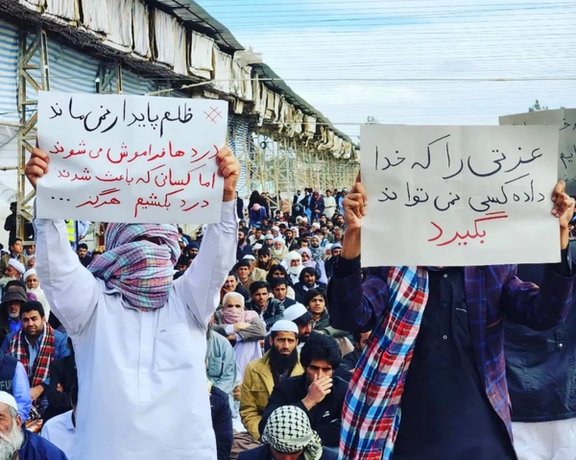
“You have put [protesters] in prison, executed them, and the problem was not solved with these executions, imprisonments and heavy sentencing … Listen to the voice of the people if you want to solve the problems,” he told the authorities.
IRGC-affiliated Fars news website quickly responded to Abdolhamid, publishing remarks by conservative regime insider Javad Larijani, brother of former parliament speaker Ali Larijani, who harshly attacked the Sunni cleric.
“It is about time for the revolutionary forces to set aside niceties with Abdolhamid. He cannot be in Iran and say we are Iranians, but pursue the policies of Iran’s enemies,” Larijani said.
Abdolhamid, officially known as Mowlana Abdolhamid Esmail-Zehi, also noted the anniversary of the Revolutionary Guards downing a Ukrainian commercial flight over Tehran with missiles on January 8, 2020, that killed all 176 onboard. “The government was definitely responsible for this tragedy but did not accept its fault. You weren’t honest with the people,” he said.
“The strength of the system does not ensue from nuclear weapons or military [power]… Strength comes from accepting faults and carrying out justice,” Abdolhamid told the thousands who had gathered at Jameh Mosque of Makki in Zahedan to pray and to take part in the weekly protests that have been held regularly after the Friday prayers since September 30.
The crackdown on protesters on September 30 during which 90-96 Baluch worshippers including children were killed and around 300 were injured has come to be known as the “Bloody Friday of Zahedan”.
Local sources say the IRGC and other security forces set up check points in some areas of Zahedan on Friday to stop the flow of people to the prayers and arrested at least nine youths after the prayers. According to Halvash, a website dedicated to news in the province, the outspoken Abdolhamid has been under pressure from intelligence and security organizations to stop his popular Friday prayers and fiery sermons.
Local sources also say security forces arrested tens of Baluch residents, including teenagers, ahead of this week’s Friday prayers. Some activist groups such as BAC put the number of detainees in the past few days at “hundreds”.
Many of the detainees have been accused of “hooliganism” or connections with foreign countries and “a terrorist group”, presumably the militant Jaish ul-Adl which has a history of deadly operations in the southwestern Sistan and Baluchestan province.
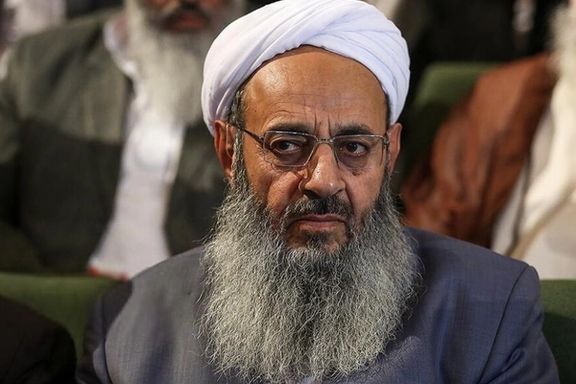
Reports say Sunni religious leader of Zahedan, Mowlavi Abdolhamid, has been under pressure by Iranian security to end his weekly protests and critical sermons on Fridays.
Halvash website that covers Baluchestan events reported Thursday that "Mowlavi Abdolhamid has rejected the requests by the security organizations".
Since September during ongoing protests following the death of 22-year-old Mahsa Amini in police custody, Mowlavi Abdolhamid has made fiery speeches against the heavy crackdown and killing of protesters, calling government actions "felony".
He has also called for holding a referendum in Iran with the presence of international observers.
The Sunni city of Zahedan in the southeastern Sistan-Baluchestan province has been witnessing protests against repressions and discriminations in the province following mass Friday prayers during the past thirteen weeks.
According to Halvash, Thursday evening a large number of military forces and plainclothes agents have been stationed in the schools of Zahedan to repress any protests on Friday January 6.
Meanwhile, other reports say during the past four days, at least 113 Baluch citizens and children have been arrested in different regions of Zahedan by security agencies.